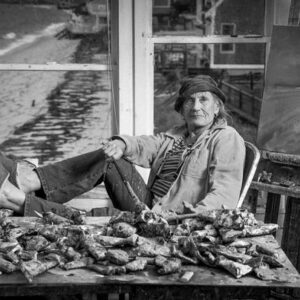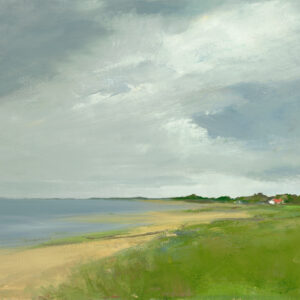
Anne Packard
The painting tradition is strong in Anne Packard’s family from grandfather, Max Bohm, turn of the century Impressionist, to her grandmother, great aunt, uncle, mother, and daughters. Packard studied at Bard College and with Philip Malicoat of Provincetown.
Anne Packard has one viewer in mind when she paints her misty Provincetown landscapes: her daughter, Cynthia. Cynthia lives across the street from her mother, and although Anne has been painting for nearly 40 years, it’s Cynthia who went to Massachusetts College of Art, Cynthia who spends five days a week in her own studio, Cynthia who pushes Anne past her fears as a painter and into the joys of paint.
Anne Packard’s landscapes, inspired by the view of Provincetown Harbor from the window of her home, are ethereal and soft.
Anne’s process can begin with a place, an incident, or just her imagination. “I paint for Cynthia’s approval,” she says. “I’ve grown tremendously, and she’s given me a lot of courage. She taught me to let go. She taught me to believe in myself. Isn’t that strange for a daughter to do for a mother?”
Longtime Provincetown resident Tony Vevers, a painter and local art historian, says Anne has come a long way over the years. “She’s broadened herself,” Vevers says. “She’s not content to stand still.”
Anne took up painting at 30, when the youngest of her five children was 6 months old. At that point, she and her family summered in Provincetown, where her grandfather, painter Max Bohm, had lived toward the end of his life and made his lyrical sea scapes. In the ’70s, Anne divorced and moved to Provincetown to live there full time.
“I used to hang my paintings outside my house, the small paintings, and try to catch what traffic I could. I’d sell them for $15 or $20, then $50 and $75,” Anne recalls.
One day, Provincetown artist Robert Motherwell wandered past. “He bought four of them and came back four or five days later, and he bought more.” Anne says. “I didn’t know who he was. Then one day I saw him on the street and asked someone. `That’s Motherwell,’ they said.” The two artists became friends, and when Anne moved to Provincetown, Motherwell let her stay in his house.
Anne and Cynthia acknowledge that they’re competitive. “It’s good,” Cynthia says. “It pushes us. We both have a hard work ethic. Most people don’t put in the hours that we do.”
